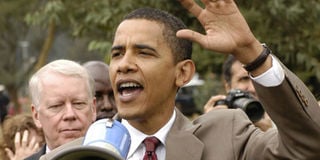State spokesman dismisses Obama after lecture on graft

Obama addressing a crowd in Kenya during his visit. Photo/FILE
What you need to know:
- He praised former Ethics and Governance permanent secretary John Githongo for exposing the Anglo Leasing scandal in January of that year.
- Githongo had alleged that some senior members of President Kibaki’s Cabinet had tried to stop investigations into the Sh50 billion Anglo Leasing-type contracts.
Senator Barack Obama, who would later become President of the United States, made his first visit to Kenya as a public official. Obama had previously visited on two occasions but as a private citizen, given his Kenyan roots.
During the week-long visit, Obama gave a lecture at the University of Nairobi (UoN) in which he criticised the Kenyan government’s inability to fight corruption and negative ethnicity.
He praised former Ethics and Governance permanent secretary John Githongo for exposing the Anglo Leasing scandal in January of that year.
“The world knows John Githongo and other whistleblowers who are fighting the insidious corruption that has weakened Kenya,” said the then Illinois senator.
Githongo had alleged that some senior members of President Kibaki’s Cabinet had tried to stop investigations into the Sh50 billion Anglo Leasing-type contracts.
Those in the spotlight were Vice-President and minister for Home Affairs Moody Awori, Head of Public Service Francis Muthaura, Justice and Constitutional Affairs minister Kiraitu Murungi, and his Finance counterpart, David Mwiraria.
Obama’s address at UoN was on August 28, 2006. His earlier visits had been in 1986 and 1992.
His comments, however, elicited harsh reactions from the state.
The government spokesman, Dr Alfred Mutua (now Machakos governor), dismissed Obama as “an inexperienced young man who could not teach Kenya how to manage its affairs”. Mutua also said Obama, whose father was Luo, was caught up in “ethnic politics”.
ALSO BEEN TO SOUTH AFRICA
Obama had also been to South Africa, where he had questioned the Thabo Mbeki government’s slow response to the Aids crisis, while in Darfur, he lashed out at ethno-racial violence.
However, pundits had more positive expectations from Obama. Prof Makau Mutua said Obama stood a better chance of becoming the next president of the US than the oft-touted candidates in the Democratic Party, senators Hillary Clinton and John Kerry.
This came to pass in the 2008 presidential election when Obama became the 44th US President.
Prof Mutua also said he hoped that Obama would use his position in the US Senate’s Foreign Relations Committee and his membership in the sub-committee on African Affairs to positively influence US foreign policy towards Africa.
Politics aside, Obama had received a hearty welcome from Kenyans when he arrived on August 24, 2006.
The then Foreign Affairs assistant minister Moses Wetang’ula had picked him and his family from Jomo Kenyatta International Airport.
He was driven in a convoy of more than 10 cars escorted by three police cars. Together with US marines, security led the Obamas to the Serena Hotel’s presidential suite.
Undaunted by the tight security, Kenyans had lined the streets to get a glimpse of the man and cheer him.
Three days later, the Obamas would proceed to his father’s ancestral home in the tiny village of Nyang’oma, Kogelo, in Siaya county.
Earlier in February, a school built with the help of the US embassy, on land owned by Obama’s father, had been renamed Senator Barack Obama.
His father’s grave and a borehole near the gate were also repaired.
The once-dilapidated Kisumu-Siaya road heading to Nyang’oma Kogelo was levelled by the Ministry of Roads and Public Works.
Like his father, Barack Hussein Obama Senior, the future president had studied at the prestigious Harvard University.
On August 27, 2006, Obama and his family, daughters Malia and Sasha and wife Michelle, had an emotional reunion with his relatives at Nyang’oma Kogelo. They were accompanied by politicians Raila Odinga, Prof Anyang’ Nyong’o, Ayiecho Olweny, Stephen Ondiek, and Odhiambo Omamba.
His grandmother, Sarah Hussein Obama, and other relatives fought back tears as they ushered Obama into his father’s homestead amid tight security. Song and dance rent the air and international and local journalists jostled for a briefing session.
The Obamas later left after having visited a non-governmental Aids agency, Care, which he personally funded to the tune of $13,000.
After official tours to other institutions such as the Kenya Medical Research Institute (Kemri), Obama ended his tour on September 1, 2006.




